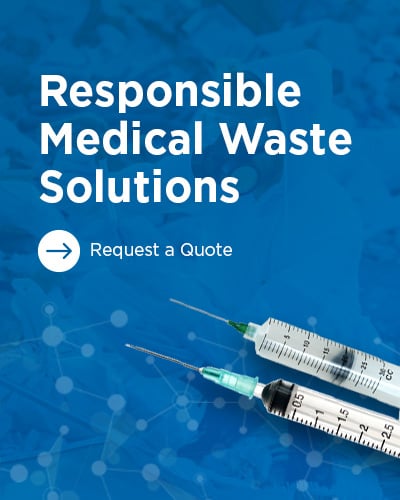In 2022 as the COVID-19 pandemic continues on, the healthcare industry continues to experience many challenges related to their biohazardous and sharps waste (medical waste). Medical waste poses a serious health risk when left out, improperly contained, or incorrectly disposed of. It is important to be aware and informed about the health risks of medical waste and why proper disposal is essential. Health care waste is generated in hospitals, laboratories, testing labs, nursing homes, blood banks, at home from self-injections, and more. In this article, you will find out what medical waste is, proper disposal, and set regulations regarding medical waste management, and disposal near you.
Medical Waste Disposal
According to a study by the World Health Organization, high-income countries generate on average up to 0.5 kg of hazardous waste per hospital bed per day; while low-income countries generate on average 0.2 kg. However, when looking at the conditions in low-income countries we find that healthcare waste is not separated into hazardous or non-hazardous wastes on a general basis which makes the quantity of hazardous waste much higher. Medical waste is healthcare waste that may be contaminated by blood, body fluids, or other potentially infectious materials also known as regulated medical waste, says the EPA. So how is medical waste disposed of?
There are two main methods that hospitals use to dispose of medical waste which are incineration and autoclaving. However, there are many ways that medical waste can be disposed of including incineration, thermal treatment such as (microwaves), steam sterilization/autoclaving, electron pyrolysis, and chemical mechanical systems.
Incineration- The EPA defines medical waste incineration as the burning of wastes produced by hospitals, veterinary facilities, and medical research facilities in a controlled environment. . The benefits of incineration include that it reduces what goes into landfills, which can save municipalities on tax dollars. The waste is completely sterilized, the volume is reduced, and the waste is kept out of the physical environment.
Autoclaving- Autoclaving/steam sterilization, is a process that uses moist heat to sterilize various medical waste, from medical instruments, applicators, and other items that contain microorganisms. During this process, medical waste is placed inside the autoclave and then exposed to high-temperature steam. This kills germs that simple detergent or boiling water can’t. The benefits of autoclaving are that it is the most commonly utilized alternative to incineration, is less costly, and carries no documented health impacts. Limitations include that it does not take care of hazardous materials like chemical waste and pharmaceutical waste.
Thermal Treatment is a process that involves thermal treatment that heats waste to temperatures at which infectious agents are killed. It is used for treating large volumes of liquid clinical wastes. A chamber is preheated to an intense, specified temperature and held for a specified time, then released. Benefits include that it reduces the waste quantity, saves on waste transportation, and eliminates harmful germs and chemicals. Disadvantages to thermal treatment include that installation is expensive and certain gasses are released in the thermal process that pollutes the environment.
Medical Waste Regulations
Now that you know the types of treatment for medical waste disposal, I’ll inform you of the regulations involved. The U.S. Environmental Protection Agency(EPA) is often involved in the regulation of medical waste disposal. The materials spread through medical waste can take on many forms such as gaseous, liquid, or solid, and it’s EPA’s duty to make sure all of these forms are regulated.
Through the years there have been multiple laws that give the EPA authority to regulate medical waste, including Clean Air Act and Clean Water Act, Resource Conservation and Recovery Act (RCRA), Toxic Substances Control Act (TSCA), and more.
The Occupational Health and Safety Administration (OSHA) regulates medical waste safety in the workplace under their Bloodborne Pathogens Standard. It requires that all employees who come in contact with medical waste be trained in proper handling, storing, labeling, and transporting of medical waste.
Medical waste should be immediately placed in a biohazardous container up to regulation and taken for disposal once 3/4 full. These containers are specifically required to be closable, puncture resistant, leakproof on all sides and bottom, and labeled or color-coded in accordance with standards. Disposal regulations may differ by state. Here, you can find your state’s disposal guidelines.
Self-Injectors
Medical waste such as sharps produced at home, especially for self-injectors, should be disposed of in a medical waste container. Improper containment of needles and syringes (sharps) increases the risk of needlestick injuries. Substitutes for sharps containers include heavy-duty containers such as laundry detergent bottles. It must be a container that doesn’t leak, is puncture resistant, and has a lockable lid. Once the container is ¾ full, take it to a supervised collection site or drop box for safe disposal and transportation. Ask your healthcare provider if you have any questions.
Workers who use sharps require education and training and should be educated in how to protect themselves during use. This also goes to protect others who may encounter sharps devices and medical waste during or after procedures.
Medical Waste Disposal Near Me
Check with your health care provider to see if they can accept your medical waste container for disposal. PureWay offers a properly regulated container for your medical waste, and easy disposal services to take care of your waste management. For more information on PureWay medical waste containers, and PureWay disposal, click on the links provided.
Learn more about PureWays free facility medical waste assessment
Phone: 877.765.3030
Web: www.PureWay.com








